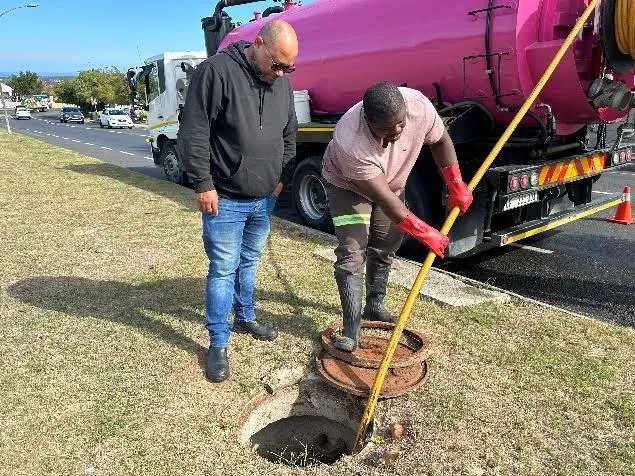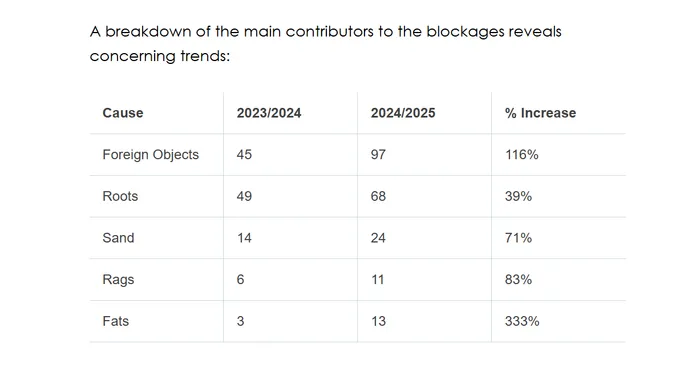Sewer blockages in Somerset West surge, with foreign objects hitting record numbers

The team attended to a blocked sewer in Somerset West
Image: City of Cape Town
Between July 2024 and March 2025, Somerset West experienced an alarming spike in sewer blockages, with 280 incidents reported—a staggering jump from the 175 blockages logged during the entire previous financial year. This rise has raised concerns about public health and sanitation in the area.
The increase is largely attributed to foreign items, with blockages caused by materials such as building debris, sanitary products, and even nappies more than doubling in frequency. In addition, the presence of sand and tree roots within the sewer system has significantly escalated, while blockages stemming from fats, oils, and grease have surged more than fourfold.
The Westridge area has emerged as a hotspot, accounting for 26% of the total blockages, with 73 reported incidents. Out of those, 24 were linked to foreign objects and 33 to tree roots. Additionally, Somerset West Business Park witnessed nine blockages, eight of which were caused by improperly disposed foreign materials.
“Residents and businesses are primary roleplayers in keeping Cape Town’s sewers clear of foreign objects that, when disposed of incorrectly, block pipes. Blockages result in sewer overflows onto our streets or in the environment, compromising hygiene and living conditions for communities, especially during winter,” said the City’s Mayoral Committee Member for Water and Sanitation, Councillor Zahid Badroodien.
As winter looms, the risk of sewer overflows increases due to higher rainfall resulting in more stormwater finding its way into the sewer network. This is particularly concerning in areas with illegal stormwater connections or vulnerable infrastructure, which can exacerbate existing blockages and lead to detrimental public health and safety hazards.
“Proactive action by residents, supported by the City, is essential to help reduce the risks ahead of the rainy season and to protect the health and safety of our communities,” Badroodien added.
To combat this growing issue, residents and businesses are urged to adopt responsible waste disposal practices:

A breakdown of the main contributors to the blockages reveals concerning trends
Image: City of Cape Town
- Dispose of waste responsibly: Only flush toilet paper and human waste. Items like wipes, diapers, and sanitary products should be thrown in bins.
- Avoid pouring fats, oils, and grease down drains: Allow these to cool and dispose of them in the bin, as they can harden in pipes and cause blockages.
- Use sinks correctly: Food scraps and other waste belong in bins, not in sinks.
The City has made it easier for residents to report water and sewer issues through several channels, including phone, SMS, email, and online services. It is recommended to save the reference number for any service request to check on its progress.
For more tips on preventing sewer blockages, visit www.capetown.gov.za/blocked-sewers.
IOL
Related Topics: